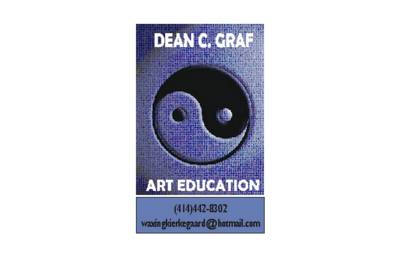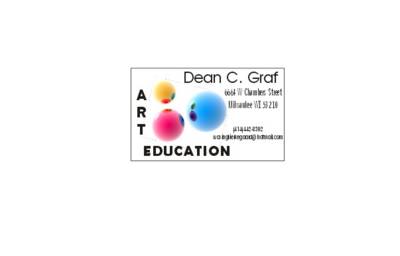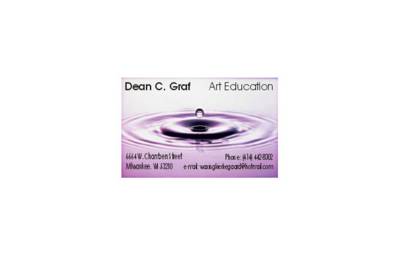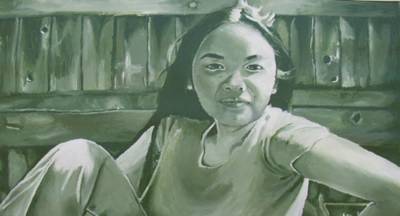
If you made it your home page, you should consider posting a thought or poem or quote now and then...or a mini bio of an artist or something...maybe.
- posted by -g @ 9:49 PM | | 0 rocks in pond
Farewell Letter to Graf
Dean,
Working with you the last two years at Morse has been the highlight of my teaching career thus far. It does seem too short. It may be, however, best that we part now, as I would have grown hateful and resentful of you not only for having the advanced class every day but also for having only 3 other classes besides. You would have been constantly gloating.
I, on the other hand, would have slowly become enraged. Muttering things under my breath - "Didn't I just organize the storage room... him and his smiling class of bright children... and his slacker schedule... and his l quotation banners... why does he get 2 computers... brown-noser... Graf he is truly evil incarnate... and his little coffee nook... and that is my refrigerator... why are those kids out in the hall... I never get to go on field trips, not my own, not with the sublime Ms. Monroe... no I stay here and work... slave while he enjoys the highlife... and the coffee nook... and that is my refrigerator... and his little coffee nook... why does he get 2 computers... and that is my refrigerator... my refrigerator... my precious... my precious... we hates the Graf... yes, yes we must destroy the Graf..."
So you see it is for the best I leave now while we are still friends.
Much love
Stuart
Stuart has been hired in the Sheboygan school district. He will be dearly missed.
- posted by -g @ 7:47 AM | | 0 rocks in pond
One Life
Against the advice of her father and uncle, who remained faithful to the principles of the Age of Reason, she would plunge into sentimental novels, swore by the poetry of Ossian, and admired Byron. She used to dance with ardor at the balls, but what she liked most were solitary horse rides in the forests and the seclusion in which she filled pages with exalted stories in French, the language she knew better than her native Polish. Of course, she had to fall in love. Her chosen one was a handsome Russian officer, Vladimir, the governor?s son. He was involved in liberal organizations but did not figure on the lists of suspects at the trial of the Decembrists.
The insistent demands of her family that she should marry were ineffectual. She pursued only Vladimir, so steadily that at last he could not resist her confession of live. Then she trembled for him when the Russo-Turkish war began and his regiment was sent to the Balkans. The news of his death at the attack on the fortress of Shumla was received by her as a sentence ending her life. Always in mourning, she chose for her only goal to find the grave of her lover and build there a mausoleum. His country was now her country and she did not want to hear of the Polilsh-Russian feud. She moved to Odessa, as it was closer to the Balkans and to the place where her beloved perished.
She was forty when the matter of the projected mausoleum brought her to Istanbul. There she met an emissary of the Polish émigrés in France, the novelist Michael Czajkowski, engaged in intelligence and organizational work against Russia in the Balkans. It happened that they started to live together, though Michael had a French wife in Paris and three children, and on one of his leaves added a fourth. Her dedication to the man was total. Now his country was her country; his work; her work. Money destined for the construction of the mausoleum went for the somewhat crazy purpose recommended by Michael.
Soliciting the protection of the Sultan, and justifying his act by high political considerations, Michael shifted from Roman Catholicism to Islam and adopted the name Mehmed Sadik. Now she became his official wife, though at the price of lowering her status to that of Turkish woman, wearing a veil, and renouncing her cherished horse rides.
Her husband, Sadik Pasha, a politician and soldier in the Crimean War, the commander of Cossack regiments, found in Miss Sniadecka, as she was stubbornly called by the Poles, a confidante, a helper, and a bright adviser in the labyrinth of international diplomacy. She used her literary talents to write innumerable reports, memos, and political letters so that her days and months and years were laborious.
Wild, self-willed, stubborn, indifferent to conventions and decency: so she was seen in her youth and that opinion proved to be correct. Nothing survived of her archive and we will never learn how she conquered Vladimir, what she was doing in Odessa, and in what circumstances her romance with Sadik started. Let us add that the contours of her face were sharp; eyes, black; skin, very white; and her frame, slender. The gossip that was circulated about her would fill volumes. Today, nobody would remember her existence, if not for that short time in her youth when she deigned to dance and ride together with the young Juliusz Slowacki, a future great Romantic poet. She did not pay attention to the boy?s feelings, and when he revealed them, she gave him a severe sermon. And many years later, when she learned that he had written of her as the only love of his life, she shrugged.
Reported by Czeslaw Milosz in Road-Side Dog
- posted by -g @ 10:58 AM | | 0 rocks in pond
Church
The redwood forest, the remains of a virgin sequoia forest. The interiors of certain Gothic cathedrals - Strasbourg, for example - replicate man's smallness and helplessness in his middle zone between hell and heaven, amid the columns of the primeval forests which still covered large areas of Europe when the cathe drals were built. But Europe never had trees like the redwoods, whose life span number over two thousand years. This forest is the idea of forest, a prototype drawn by God; no church columns attain that height, and never does a church's semi-darkness contrast so sharply with a ray slanting in from above the reach of sight.
Encounter
We were riding through frozen fields in a wagon at dawn.
A red wing rose in the darkness.
And suddenly a hare ran across the road.
One of us pointed to it with his hand.
That was long ago. Today neither of them is alive,
Not the hare, nor the man who made the gesture.
O my love, where are they, where are they going
The flash of a hand, streak of movement, rustle of pebbles.
I ask not out of sorrow, but in wonder.
-Czeslaw Milosz
- posted by -g @ 5:27 AM | | 0 rocks in pond

Perfect balance turned sideways.

- posted by -g @ 9:08 PM | | 0 rocks in pond

Primary and Secondary...a reflection of my surroundings

- posted by -g @ 8:50 PM | | 0 rocks in pond

I'm just a drop in the education bucket

- posted by -g @ 8:45 PM | | 0 rocks in pond
On Education and Art and Poetry and Prose and Metaphor - for Eva's disection:
Now all art falls into two great divisions: poetry and prose. This is, roughly, Plato's division between untrue tales and true tales. Poetry is pure imagination; prose is imagination as controlled by and consciously expressive of thought. Poetry first, prose afterwards. That formula contains the true view of art's place in life, as opposed to the false view that prose comes first and that poetry only decorates this pre-existent object. We begin by imagining, and in imagining we discover our thought - a thought that did not actually exist till discovered. Poetry is the "mother-tongue of mankind", the universal form of primitive literature, preceding it in historical evolution at every phase of the world's history. The consciousness that first expresses itself in poetry - in fantasy and myth - afterwards clarifies out and sobers down into prose - into science and philosophy. The progress of thought is a perpetual passage from poetry to prose and a perpetual birth of new thought in the form of poetry.
The distinction between poetry and prose is the key to the distinction between education and life. Education is the preface to life; the preparation for life. This preface or preparation turns out, on examination, to be made of the stuff of which poetry is made. Just as poetry proceeds by creating imaginary objects and dealing with them according to laws laid down by the imagination for itself, so education proceeds by setting imaginary problems and solving them according to arbitrary rules. By raising and solving these imaginary problems the student learns how to solve the real problems of what is significantly called - as opposed to school - "real" life. Education, as the antithesis of real life, is unreal life, imaginary life - a life in which we imagine ourselves in the world of affairs without really being there or even believing ourselves to be there. It is the essence of school life that the student should be engaged upon experimenta in corpore vili, that he should not bring disaster upon himself when he fails or involve his rivals in disaster when he succeeds; that his successes and failures should be mimic successes and mimic failures. But this imaginary or mimic life really equips him for the work of real life just because its problems, though only imaginary problems, are problems at which he really works and does not merely imagine himself as working. If he only imagined himself to be working at them, his schooling would do him no good; he would awake from it as from a dream and find the real world as alien and intractable as ever (how many students do?).
Real life, on the other hand, partakes of the nature of prose. For in prose the imagination is still awake and active, but it is working under the control of thought. Prose is not prose unless it is beautiful, but its beauty must be achieved not by the free imaginative treatment of an arbitrary problem, but by the lucidity and vividness with which thought solves the necessary problem of expressing to itself the nature of the real world. In real life we are not free to work at whatever strikes the fancy of those responsible for organizing our society; our problems are forced upon us by reality itself, which bids us solve them or perish. They are not mimic problems, but real problems. And our solutions of them may certainly be beautiful, but only as the locomotive and the ship are beautiful, with the prose beauty of clean design.
Since the purpose of education is to prepare the pupil for real life, education is poetry whose function is to pass over into prose. If this seems an unprofitably abstract account of education, a mere empty dialectical formula which, however it may amuse a frivolous philosopher, can do nobody any good, let us look at it from a practical point of view and see what consequences follow when it is so taken. Let us consider various arts, and ask ourselves how the above principle applies to them. Let us begin with literature.
Here our principle yields two propositions: first, that literary education ought to proceed by way of poetry; secondly, that its function is to give birth to prose. Its end is to enable the pupil to express his own thoughts clearly and intelligibly, and to understand the expressed thoughts of others. He is to be judged not by his knowledge of books, but by his own literary output - his conversation, his business letters, his memoranda, his instructions to subordinates, and conversely, his ability to read a letter, to listen intelligently, to understand other people's instructions. These things are the purpose of literature. Its poetry, which constitutes the means of literary education, is similarly twofold, proceeding by creation and absorption. The student must not only read Shakespeare and Milton, but - in reality far more important - hear nursery rhymes and childish stories, read all manner of fiction and of fact, read as if it were fiction; simple narrative history - novels, detective stories, and so forth - are the food for such endeavors. The teacher's part is to select such fictions as will most helpfully stimulate his imagination, neither feeding the student on food too hard for a tender stomach nor putting the student off with milk when meat is appropriate, and, above all, not frittering away the student's strength by introducing all manner of works in all manner of styles from all manner of periods irrespective of special needs and the special problems indicative of develpmental approrpiateness. On the other hand, and this is the more important side, the student must be taught to create poetry, not only by writing verse - an exercise that is not even yet sufficiently accepted as a necessary part of elementary education - but by writing prose essays on a theme arbitrarily chosen, which are philosophically, though not metrically, poetry. And here again, the teacher's function is to demand of the pupil precisely that standard of excellence which the student could reasonably demand of self.
The same principles hold good with respect to the training of the eye. Drawing, painting and modeling here correspond to the creative side of education, and the study of drawings, paintings and modeled objects to the receptive side. The distinction between poetry as a means and prose as an end holds good. There is imaginative drawing pure and simple (like an artist's sketch) and there is drawing whose purpose is to express thought (like an engineer's diagram). The function of this branch of education is to enable the student to express self in prose drawing; to draw a map to show someone where to go, or a face that needs remembering, or a piece of work that a builder or a smith must execute, and conversely, to understand and use such drawings. This ability can only come through practice in poetic drawing, the free and imaginative presentation of any form that comes into your head. First, learn to control your medium, to handle pencil and brush - then apply your skill to the problem at hand.
Without a training of this kind no one is properly educated. And this we partly recognize when we insist that everybody who is to be thought educated must read and write; for writing is nothing but a specialized form of drawing, and reading is a similarly specialized interpretation of drawings. But, by a fatal confusion of thought, we separate drawing from writing and assume that, while everyone can write if they give it time and practice, drawing requires a special gift. This is simply an illusion. The same muscular control and training of eye which enables a pupil to write applies to drawing; not, perhaps, as well as Dürer could draw; but that is no reason why drawing should be neglected. We might as well refrain from speaking because it is unlikely the we will ever to speak as well as Cicero. The ordinary human needs to speak, to write, to draw, ordinarily well, and no more - but that much we do seriously need. We recognize the possibility and the necessity of this in the case of certain professions and trades that simply cannot be carried on without drawing. In these cases no one would accept the plea that an engineer's or surveyor's drawings are bad because he is one of the people who tries to learn it. But we might extend the principle a little further. Everyone would despise a collector of folk-songs who wrote: "I heard a very interesting tune on this journey, but my secretary, who knows how to write music, was not with me". This means that the authority on ancient art is someone who cannot draw, and the one who makes a drawing is no authority on ancient art; and the result is that the expert's opinions and the artist's drawings are, each in its own way, irremediably damaged. A person can get along without being able to read; and hard labor may make the latter a scholar and the former an historian of art. But a scholar who has to depend upon others to read aloud for proper understanding is less severely handicapped than an art historian unable to handle the medium which he is studying. Learning to make a decently good drawing is no harder than learning to read.
At the other end of the scale, it is equally discreditable that an artisan should not be able to work from a drawing without somebody at hand to explain the drawing; and that any person who wants something made should not be able to supply the maker with a drawing of what is desired; and that anyone whatever should write an illegible hand. "Anyone who has the use of limbs," wrote Lord Chesterfield, "can write any hand he likes," which is perfectly true; but Lord Chesterfield, in his eighteenth century individualism, forgot that the fathers have eaten the sour grapes by which the children's teeth are set on edge, and that to have the use of one's limbs one must be trained in accurate muscular control at an early age. To write badly is certainly a thing to be ashamed of; but the blame lies partly at least with those who have neglected the bad writer's elementary education.
There is room for at least equal improvement with regard to music. Here song is the poetry of which articulate and modulated speech is the prose; and a person badly educated in a musical sense is one who cannot so control the mechanism of speech as to make his/her voice audible and expressive. The best preparation for speaking is to be had by learning to sing; and all those failures of elocution which mar the utterance of so many speakers are due to errors in the technique of voice- production which are, in the main, easily corrigible by a good teacher - are, in fact, the faults which in the very first lessons every music teacher sets about to eradicate. Yet these faults are startlingly common even among persons whose production requires them constantly to speak in public. The same general principles govern the art of bodily gesture, where the poetry is dancing in all its branches - including every kind of athletic exercise. The Greeks were quite right to regard military drill as a kind of dance; and athletic exercises in general are, as the Greeks knew, an indispensable part of all education.
These notes must suffice to show that our conception of aesthetic education is no mere theory, but a principle that may powerfully help in the work both of understanding education as it is and of creating education as it ought to be. Developed along the lines suggested above, it leads to some such educational programme as this. Education in the arts, which is the only education that can be regarded as truly universal, ought to begin - where in point of fact it always has begun - in the nursery, as soon as a child becomes educable which means, as soon as the child acquires regular physiological habits whose establishment is the first care of mother and nurse; and this should form the main contents of what we call elementary schooling. The child should learn to speak fluently and clearly, not necessarily in the standard English of literary circles, but in the dialect of their native place; for the attempt to eradicate local peculiarities of grammar and pronunication is only a waste of precious time in the pursuit of a motiveless and unattainable uniformity.
This, then is the beginning of my thought on education as a poetry to the real life we are being trained or educated for. It has, indeed, a bit of refinement to undergo, but the essence is at hand for you to address.
- posted by -g @ 5:49 PM | | 0 rocks in pond
Well Then
Horace Pitkin, the son of a wealthy merchant, was converted and went to China as a missionary. He wrote to his friends in America, saying, "It will be but a short time till we know definitely know whether we can serve Him better above or here." Shortly afterward, a mob stormed the gate at the compound were Pitkin defended the women and children. He was beheaded and his head was offered at the shrine of a heathen god, while his body was thrown into a pit with the bodies of nine Chinese Christians. Sherwood Eddy, writing about him, said, "Pitkin won more men by his death than he ever could have won by his life."
- posted by -g @ 4:56 PM | | 0 rocks in pond
Real life and real living are not a direct correlation to how rich you are.Being Rich
Two ways to be rich include having a lot and wanting little. The latter is necessary for most of us. Many are miserable because of wants not satisfied. It is a suffering that can be defined as "thing-itis". How do we learn the secret of adjusting our wants to our needs?
There was a poor man who had an overnight guest, and as he showed him to his humble bedroom in the hayloft, he said, "If there is anything you need, just call, I'll come show you how to get along without it."
Our God is a consuming fire
And will destroy earth's temporal things.
He purifies our life
For service to the King of knigs.
Hold tightly to what is eternal
And loosely to what is temporal.
- posted by -g @ 8:31 AM | | 0 rocks in pond
Math
Leaf arrangements in plants have a huge and distinguished accumulation of literature in regards to mathematics. Early approaches have been purely descriptive - they do not explain how the numbers relate to the plant growth. They sort out the geometry of arrangements, but nothing more. Thanks to the work of French mathematical physicists Stephane Douady and Yves Couder, we now have a theory of dynamic plant growth in computer models via laboratory experiments to show that the Fibonacci pattern is indeed essential to the biological and descriptive essence of growth in plants. What is essential to your biological and descriptive essence?
- posted by -g @ 5:23 PM | | 0 rocks in pond

Who would like to say something about this?

- posted by -g @ 5:14 PM | | 0 rocks in pond

David has returned from Sudan. He has stories to tell. If you wish to hear them, let him know. He may need some coaxing because though he is quite powerful by nature of his humility, he is shy enough not to tell them if he perceives that it may be for the sole purpose of self glorification. I for one believe his stories will be a catalyst for each of us to live more fully and think less of self. Please David???

- posted by -g @ 8:14 PM | | 0 rocks in pond

What do you see?

- posted by -g @ 10:22 AM | | 0 rocks in pond
Seeing things that are not there.
"The Enigma" by Isia Leviant (1984)
- posted by -g @ 10:11 AM | | 0 rocks in pond
critical lawnmower
humble dan
potting soil
diarrhea of the brain
bad haiku daily
thegreatlockbox
dirty laundry
emily joy joy
Subscribe to
Comments [Atom]
